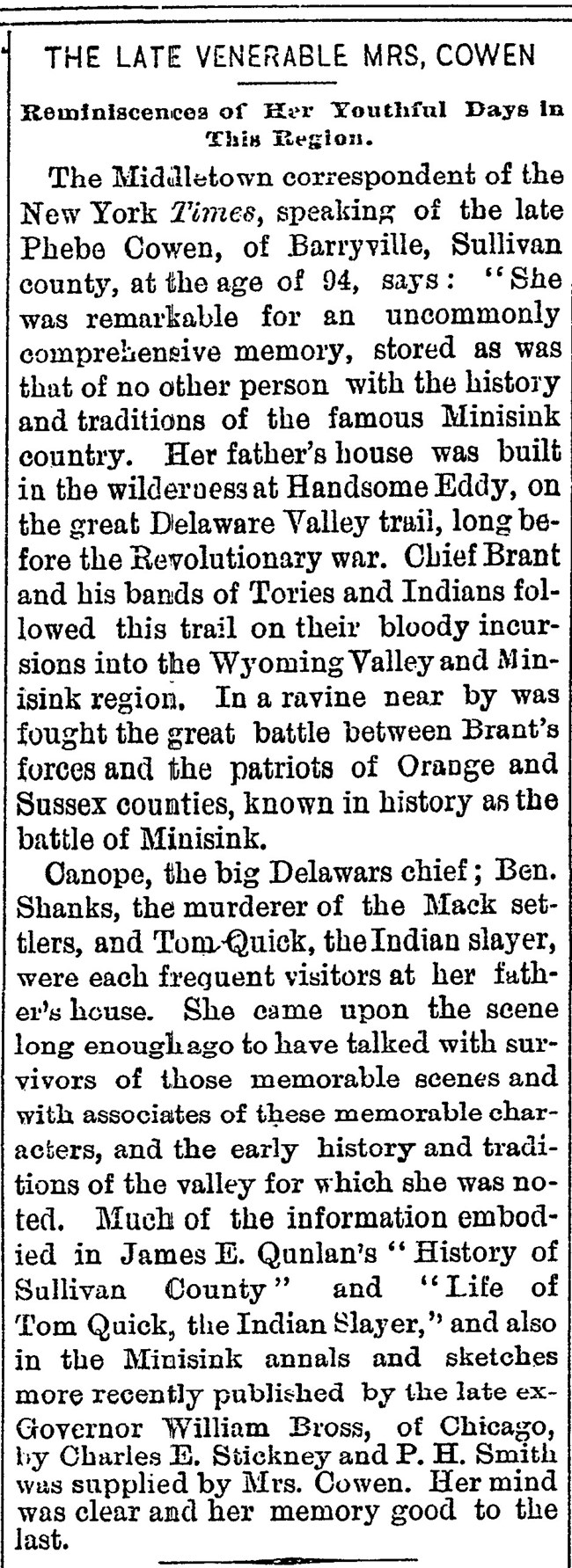|
In the late 1830s, as much of the Delaware and Hudson Canal was booming, the entrepreneurial Joseph Cowen began to establish his farmstead along its banks. Cowen, like many others, came to the Delaware River Valley to take advantage of the economy of the area that had flourished with robust transportation, logging, mining, and tanning industries after the construction of the canal. New residents of the area opened stores to support the larger local population and those traveling along the canal. Supplies like flour, wheat, and bluestone were shipped along the canal to support quickly forming towns. Lock tenders, foremen, boat builders, and store owners also operated small farms to provide income during the summer months when the canal was in operation. Joseph Cowen, considered to be the first owner of Cowen Farm, was among such population.

To stock the storefront, Cowen maintained a small farm that primarily grew potatoes, buckwheat, and hay, which provided a small surplus for his market, sustenance for his family, and feed for a small amount of livestock. Fruits such as raspberries, blackberries, and strawberries were also sold. In the 1860 agricultural census, Cowen’s real estate and personal assets are on the higher end of his neighbors, $2,500 and $1,000 respectively, suggesting that the Cowens were doing more than selling their agricultural goods along the canal. Cowen built much of his life here as did his wife, Phoebe. It is believed that their marriage was full of strife and quarrel, particularly given Joseph’s natural propensity to engage in “trivial controversies and petty litigation.” A colorful account from John Willard Johnston, a relative of Phoebe's wrote that Joseph was a cantankerous and litigious individual who was known for his use of foul language and violence. Willard also wrote that, “Justices of the peace, lawyers and citizens were frequently summoned to his house to allay strifes” and that Cowen “was an Irishman of undivided blood.” Despite Cowen’s strong personality, Phoebe was noted to be a rather tenacious woman as well. The daughter of Stephen and Anna Bishop, Phoebe’s lineage was deeply connected to the area as her mother is believed to be the first woman to have settled in the town of Barryville, where Phoebe was born. Coming from a well known family, Phoebe was described as the “exotic” outcast. In an account by the same relative, she was described as of “buoyant spirit; loud, clear, and piercing voice, and like her husband, an incorrigible temper.” Phoebe was married at the age of 16 to David Quick and later to Joseph Cowen after the passing of Quick. The stories from her obituary provide a sketch of her hardy personality and life in the Delaware Valley. One of these stories is that when first moving to Pond Eddy after marrying Quick, “the nearest trading point was Milford, PA, about 16 miles distant, and she repeatedly made the trip from her home to Milford and back in a day, having to swim the horse through the Delaware, and the route being through an unbroken wilderness.” As the area became more built up thanks to the Delaware and Hudson Canal Company, engineers working on projects would often board at her house. Joseph and Phoebe had one daughter together, Caroline, who lived at Cowen Farm with her husband shortly after the death of her father in 1864. Phoebe stayed on the property with her daughter and son-in-law until her death in 1890. All in all, the Cowen-Stages ultimately owned the land for at least 80 years. |
Last updated: December 15, 2020
